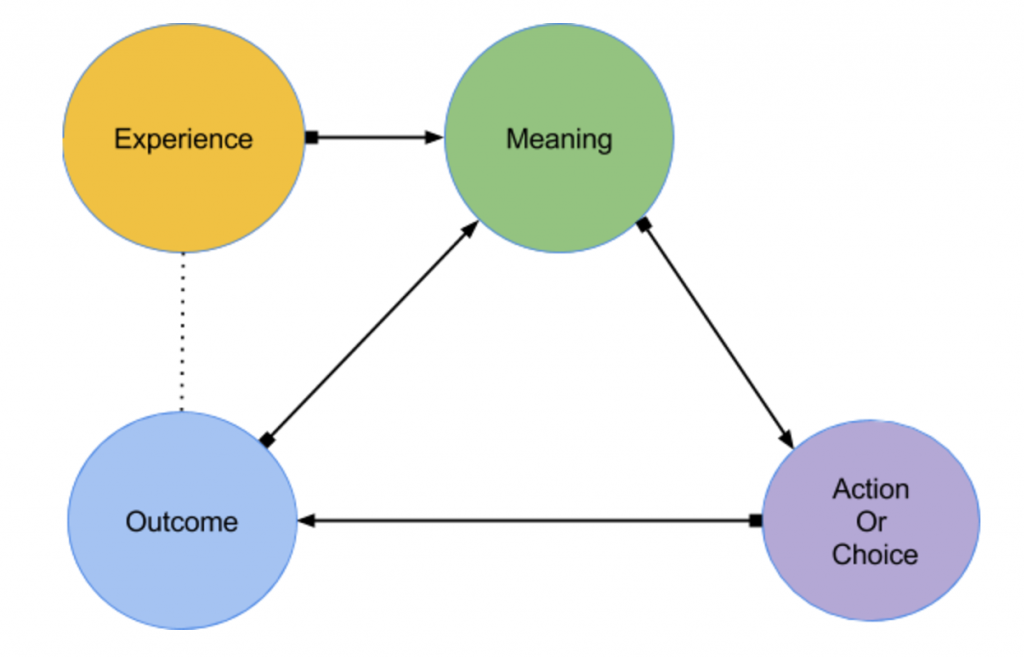Lately I have been taking inventory of my beliefs, my ideals, and my guiding philosophies. One focus of reflection is language that once felt vital and inspiring but now feels dead, or at least murky. Words like “health,” “liberation,” and “manifestation,” once felt so vibrant. After years of repetition, mission creep, and marketing campaigns, I no longer know what they mean to me.

All of these leaves grow from a living tree, and my hope is to find the vitality at the source of the tree. At times I doubt there is a tree at all. At other times, I feel the tree with such vitality and urgency that it sends me back out into the world fighting and laughing. But I can confuse the leaves with the tree, which becomes problematic when the leaves grow dry. Are they shriveled dry leaves ready to be shed, or are they simply needing more light and water to be renewed?
Health and Wellness
These words feel increasingly like knives, like “shoulds.” They are judgment words pointed to promote a political or marketing agenda. There’s no coherent philosophy or objective measure to use in assessing health. A culture war, rather, rages around definitions of health. Is it healthy to take pills or supplements? To be vaccinated or to drink your own urine? What attitudes and behaviors are healthy? Is it healthy to eat a high-fat diet or a carb-heavy diet?
The etymological root of “health” is wholeness, making it a synonym for integrity. These days I think “health” is measurable by our values, goals, and behavior. We can be healthy with chronic disease, if we accept the disease and what must be done to live as close as possible to the life we want. We can be healthy in accepting our limitations and giving up the life we thought we wanted. We can be healthy in working to be less limited. But that’s a very psychotherapist-y view of health.
Manifestation
Once this word conveyed a world of magic: to manifest something that before did not exist. We could manifest spirits, books, special objects, relationships. These days, I mostly see the word on social media advertisements about manifesting lots of money or markers of success and status. It’s implicitly I-centered, as though the one who makes manifest is the elevated one who does things to the world to get manifestations. In that realm of thinking, the elevated individual, lies this increasingly disturbing rhetoric about other people being “bots” or “NPCs” with no subjectivity of their own.
What feels vibrant in the term is the sense of participating in the world and being in relationship with larger forces. I’ve never loved the term “co-create” though the concept is useful—it’s just a word that doesn’t feel flowing to say or write. Yet it’s approaching what I think is true. Whatever is manifested arises from a field of relationships in which you are only one ingredient. To make a beautiful wooden sculpture manifest, I could have the money to buy it—that’s the easy way—or the blade and the skills to carve one from good wood. But I don’t create the sturdy branch from which I carve the sculpture—that was manifested by the tree. And I don’t possess the spirit that inspired me to discover the sculpture within the branch, that emerges in a flash from beyond, or from the dance of skill, blade, and wood.
Liberation
When I first learned about liberation theology movements in high school, the word “liberation” had so much edge and potency. Using the teachings of Jesus Christ to validate direct action and the resistance of political violence, disenfranchisement, and oppression. It’s become a central word in my spiritual practice, comparable to “enlightenment” in its expression of a state of spiritual realization that comes from diligent work.
Yet these days the word feels not so much dead as murky and conflicted. What warrants the word? Is it middle class white liberal self-serving to use the word “liberation” for my own spiritual and therapeutic practice? Does it diminish those fiercer forms of liberation?
When I think of liberation, I think of consciousness and agency. We are laden with cultural conditioning, habit, political oppression, and economic exploitation. All of these, to very different intensities, encourage us to live quiet, unconsidered, asleep lives of bare survival. Bringing the light of awareness into this domains, waking up to their realities, and seeing the potential within that has been compromised by these forces makes the work of liberation possible. What feels liberatory is having more power, more choice, the will and capacity to influence the conditions of our lives according to our personal and collective wills.
Quitting nicotine use could be a smaller liberatory act. It requires looking at my conditioning and habit and creating a space of awareness that makes choice possible. It divests my energy and money from the people who profit off my actions and makes it available for whatever else I wish to do. Going on strike seems a bigger liberatory act in demonstrating the power of the group and using it to set the terms of your labor. The work of creating autonomous spaces within oppressive regimes would be a much larger kind of liberation.
Aliveness and Vitality
These words feel the most fresh and intriguing. Aliveness and vitality convey a subjective feeling of being in the world that is a step beyond awareness. For a long time, my work on awareness and consciousness was in the employ of scared parts of me that resisted aliveness. One of my counseling mentors used the word “aliveness” for one of her consult groups, and then I began practicing Aikido, where we occasionally speak of the aliveness in our practice. The word kindled a fire within me and scared me. Being alive is quite vulnerable. You have so much at stake and so much to lose that’s not hidden behind veils of distraction and numbness.
But also it makes life so much sweeter, so much more satisfying, and in a paradoxical way it makes life easier to lose. What I notice is those who are most afraid of death also tend to avoid aliveness. The fear of losing everything is so great that they avoid having anything worth losing. Yet the people who seem most alive to me take in more nourishment, and seem to have an easier time accepting the little and larger deaths that come with living. Losing is less scary because there’s a confidence that they can get more of what they need. Losing is less scary because they’ve delighted in eating as much of the apple as they could, and the rest is a gift to the earth.



